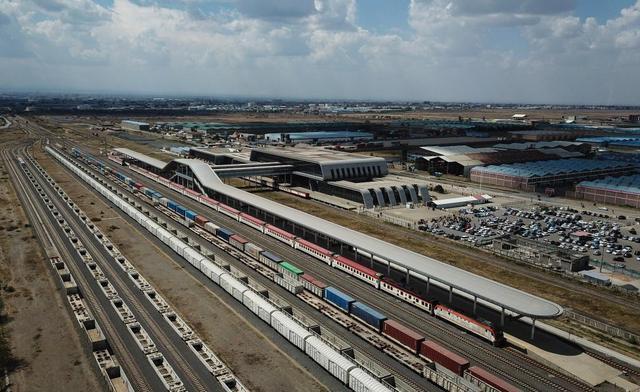
The forthcoming 2024 Summit of the Forum on China-Africa Cooperation (FOCAC) is set to convene in Beijing from September 4th to 6th. On August 29th, China released a report on the achievements of China-Africa cooperation under the Belt and Road Initiative. Xu Jianping, director of the Department of Regional Opening-up at the National Development and Reform Commission, elucidated the report's focal points on "three major achievements" and "three major prospects" at a recent press briefing.
Three major achievements
First, infrastructure "hard connectivity" has been enhanced. Chinese companies have participated in the construction and renovation of over 10,000 kilometers of railways, nearly 100,000 km of highways, close to 1,000 bridges, and nearly 100 ports. Additionally, they have built 66,000 km of power transmission and transformation lines, along with 150,000 km of backbone communication networks across the continent.
In the realm of railways, projects such as the Mombasa-Nairobi Standard Gauge Railway (SGR) in Kenya, the Addis Ababa-Djibouti Railway in Ethiopia, and the Abuja-Kaduna Railway in Nigeria have been instrumental in establishing a foundational railway network across the continent.
In highway infrastructure, the Nairobi Expressway in Kenya, the No. 1 National Highway in the Republic of Congo, and the Algerian North-South Highway have been pivotal in elevating Africa's road accessibility. Port development projects like the Lekki Deep Sea Port in Nigeria, the Kribi Deep Seaport in Cameroon, and the Abidjan Port in Côte d'Ivoire have bolstered maritime transport and trade capabilities.
In the power sector, projects including the Souapiti Hydropower Station in Guinea, the Gouina Hydropower Station in Mali, and the Djibloho Hydropower Plant in Equatorial Guinea have been constructed, effectively improving the power supply in Africa.

Second, regulatory "soft connectivity" has been strengthened. In terms of trade and economic rule alignment, by the end of this June, China had implemented zero tariffs on 98 percent of products originating from 27 of Africa's least developed countries. China has also signed bilateral agreements on the promotion and protection of investment with 34 African countries as well as agreements on the elimination of double taxation with 21 African countries.
These efforts in "soft connectivity" have bolstered trade relations, with China-Africa trade volume reaching a record $282.1 billion in 2023, marking the second consecutive year of a new historical peak. China's direct investment stock in Africa also surpassed $40 billion by the end of 2023.
Third, China-Africa people-to-people "heart connectivity" has been deepened. In poverty alleviation and livelihood projects, by June this year, China had provided aid to 53 African countries, implementing a range of livelihood projects in areas such as food security, water supply, maternal and child health, and education, benefiting over 10 million people.
On the educational front, the joint programs to help African students find employment along with the establishment of dedicated scholarships, the Institute of South-South Cooperation and Development, the "Leading Goose" program, and 17 "Luban Workshops" nurture a significant pool of skilled professionals in Africa.
In healthcare, China's contributions include the construction of over 130 hospitals and clinics in Africa and the deployment of Chinese medical teams to 45 African countries. Partnership mechanisms have been established with 46 African hospitals, significantly enhancing local healthcare systems.
Three major prospects
First, furtherconsolidatingChina-Africa cooperation. The two sides will continue to deepen exchanges in governance experience and align the "Belt and Road" initiative with the African Union's "Agenda 2063" and the UN's 2030 Agenda for Sustainable Development, thereby enhancing the comprehensive strategic partnership.
Second, expanding new areas of joint cooperation. China and Africa will intensify collaboration in healthcare, implement green development initiatives, bolster digital infrastructure, and cultivate a more robust innovative partnership.
Third, elevating livelihoods and well-being. Joint efforts will focus on invigorating economic growth, establishing inclusive international cooperation platforms, and propelling Africa's socio-economic advancement, laying a solid foundation for improving living standards.
《中国—非洲国家共建“一带一路”发展报告》2024版蓝皮书发布
2024年中非合作论坛峰会将于9月4日至6日在北京举行。《中国—非洲国家共建“一带一路”发展报告》2024版蓝皮书于8月29日正式公开发布。国家发展改革委区域开放司司长徐建平在新闻发布会上介绍了蓝皮书有关“三大成就”“三大展望”的内容。
“三大成就”
一是基础设施“硬联通”迈上新台阶。目前,中国企业已在非洲各国累计参与新建和改造铁路超过1万公里、公路近10万公里、桥梁近千座、港口近百个、输变电线路6.6万公里、骨干通讯网络15万公里。
在铁路方面,建设了肯尼亚蒙内铁路、埃塞俄比亚至吉布提亚吉铁路、尼日利亚阿卡铁路等一批项目,助力非洲初步形成了铁路骨干网。
在公路方面,建设了肯尼亚内罗毕快速路、刚果(布)国家1号公路、阿尔及利亚南北高速公路等一批项目,有效提升了非洲公路通达水平。在港口方面,建设了尼日利亚莱基深水港、喀麦隆克里比深水港、科特迪瓦阿比让港等一批项目,有效增强了非洲国家海运和贸易发展动能。
在电力方面,建设了几内亚苏阿皮蒂水利枢纽工程、马里古伊那水电站、赤道几内亚吉布劳水电站等一批项目,有效改善了非洲电力供给。
二是规则标准“软联通”迈上新台阶。在经贸规则对接方面,截至今年6月底,中国对原产于27个非洲最不发达国家的98%税目产品实施零关税,与34个非洲国家签署了双边促进和保护投资协定,与21个非洲国家签署了避免双重征税协定。
在中非经贸规则“软联通”的支撑和保障下,2023年中非贸易额达2821亿美元,连续第二年刷新历史峰值;截至2023年底,中国对非直接投资存量超过400亿美元。
三是中非人民“心联通”迈上新台阶。在减贫惠民方面,截至今年6月底,中国已向非洲53个国家提供援助资金,实施粮食、供水、妇幼、教育等一批民生项目,受益人数超过1000万人。
在人才培养方面,中非共同实施“非洲留学生就业直通车”计划,设立了多个奖学金专项,成立了南南合作与发展学院,实施“头雁计划”,目前已在非洲建成17个“鲁班工坊”,为非洲国家培养了一大批高技能人才。
在卫生健康方面,中国在非洲援建了130多家医院和诊所,向45个非洲国家派遣中国医疗队,与46家非洲医院建立对口合作机制,帮助非洲国家提升医疗卫生水平。
“三大展望”
一是持续共同夯实中非务实合作基础。中非将不断深化治国理政经验交流,共同推动共建“一带一路”倡议与非洲联盟《2063年议程》、联合国2030年可持续发展议程加强对接,不断提升中非全面战略合作伙伴关系水平。
二是持续共同拓展中非共建合作新领域。中非将持续加强卫生健康领域合作,共同实施绿色发展行动,持续加强数字基础设施建设,持续建设更加紧密的创新合作伙伴关系。
三是持续共同提升民生福祉。中非将共同增强经济发展动能,搭建广泛参与的国际合作平台,促进非洲经济社会发展,为民生改善提供物质基础。
文|记者 王莉
图丨新华社
翻译|史洋溢
英文审校|赵凡
-
Guangdong's 32 paralympic athletes chasing dreams in Paris
2024-08-30 21:10:12 -
Video | 'Wing Chun' is coming to London! 舞剧《咏春》即将登陆伦敦!
2024-08-30 21:10:27 -
Cantonese opera meets Choy Li Fut: Guangzhou Yueju Opera Theater unveils 'Southern Fist'
2024-08-29 21:45:12 -
The number of exhibitions in Guangdong has reached a new high, with a growth of 266.7%
2024-08-29 21:45:21






